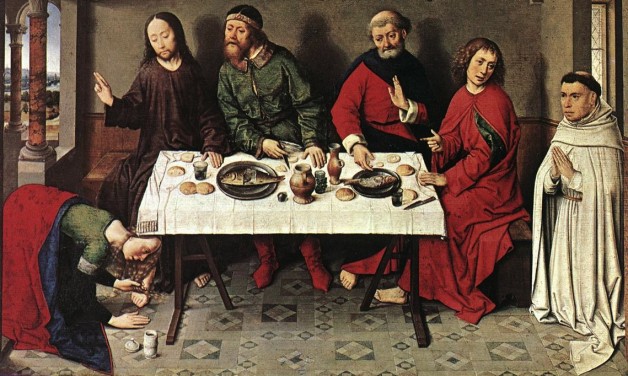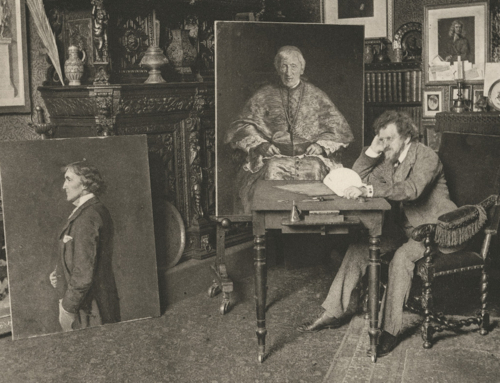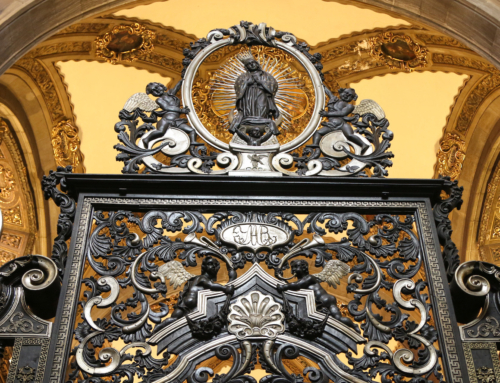St. Mary Magdalene is an icon of God’s mercy. Her life magnifies the workings of God’s love: how He heals us, restores our dignity, befriends us, and calls us beyond ourselves.
Leaving aside the tradition that she was a prostitute and the confusion about the different Marys in the New Testament, we are left with a simple introduction: “ . . . Mary called Magdalene, from whom seven demons had gone out . . . ” (Luke 8:2). Seven demons—that’s nothing to scoff at! Whether or not she was a scandalous sinner, Magdalene knew the healing balm of God’s mercy.
To draw out the significance of this exorcism, we can compare Joshua and Jesus (in Hebrew, their names are identical). Joshua led the Israelites into their long-awaited Promised Land, driving out the seven occupying nations: the Canaanites, Hittites, Hivites, Perizzites, Girgashites, Amorites and Jebusites (Josh 3:10). Likewise, Jesus—the new Joshua—found His beloved occupied by seven demons, and by His mercy, He freed her and claimed her as His own. Mary of Magdala can sing with Mary of Nazareth: “the Almighty has done great things for me . . . He has shown the strength of his arm . . . for he has remembered his promise of mercy” (Luke 1:49-54).
Three important points can be highlighted from this comparison. First, Jesus initiates. His mercy anticipates Magdalene’s action. The Israelites waited forty years before entering the Promised Land, but Jesus desired Magdalene for all eternity. Second, Jesus wants to dwell in Mary’s heart with a celibate, but profound love. His mercy is relational. By analogy, His are the words of the Prophet Isaiah:
No more shall you be called ‘Forsaken,’
nor your land called ‘Desolate,’
But you shall be called ‘My Delight is in her,’
and your land ‘Espoused.’
For the Lord delights in you,
and your land shall be espoused.
For as a young man marries a virgin,
your Builder shall marry you;
And as a bridegroom rejoices in his bride
so shall your God rejoice in you. (Is 62:4-5)
Christ frees Mary from the destructive grip of demons and instead offers His abiding, life-giving presence. Third, Jesus’ mercy is strong. The Israelites eventually succumb to invading armies, but Jesus never surrenders his beloved. “For great is his mercy toward us; and the faithfulness of the Lord endures for ever. Praise the Lord!” (Ps 117:2).
God’s mercy flowers into a friendship of discipleship between Jesus and Magdalene. She follows Him throughout Galilee, supporting Him and the Apostles. She then follows them into Jerusalem, and when others flee, she remains at the Cross. At the tomb, she seeks her Teacher and is the first to witness the Resurrected Lord.
As a friend, Magdalene reciprocates God’s desire for her. The beloved whom Jesus seeks with chaste devotion now seeks her lover in turn. Or, to use St. Catherine of Siena’s imagery, God who is drunk with love has inebriated His beloved with that same love. In one of her letters, Catherine wrote of Magdalene:
She was no more self-conscious than a drunken woman, whether alone or with others. Otherwise she would never have been among those soldiers of Pilate, nor would she have gone and stayed alone at the tomb. Love kept her from thinking, “What will it look like? Will people speak ill of me because I am rich and beautiful?” Her thoughts weren’t here, but only on how she might find and follow her Master. (T165)
Within this friendship, Jesus calls her to a specific task. He sends her as the Apostle to the Apostles to announce the Resurrection to Jesus’ disciples (John 20:17). Here we see the wonders of God’s mercy. He heals us, He dwells within us, He seeks our friendship, and He entrusts us with His ministry.
This connection of mercy to ministry is not unique to Mary Magdalene. Both Matthew, a tax collector, and Paul, a persecutor of the Church, were forgiven by Jesus as he summoned them to proclaim the Gospel. Paul summarizes this connection, writing: “Therefore, having this ministry by the mercy of God, we do not lose heart” (2 Cor 4:1).
In his own vocation story, Pope Francis shared how he experienced the connection of mercy and ministry through the sacrament of confession. He recalls that pivotal day:
I do not know why that particular priest was there, whom I did not know, or why I felt this desire to confess. But the truth is that Someone was waiting for me. He had been waiting for me for some time. After making my confession, I felt something had changed. I was not the same. I had heard something like a voice or a call. I was convinced that I should become a priest. (9/21/2013)
His papal motto, Miserando atque Eligendo, encapsulates this grace. This Latin phrase comes from St. Bede’s commentary on the call of St. Matthew: “Vidit publicánum et, quia miserándo atque eligéndo vidit, ait illi: Séquere me (He saw the tax collector, and, because he saw him through the eyes of mercy and chose him, he said to him: ‘Follow me.’)”
The mercy that changed Mary Magdalene’s life still envelops the world today. The Lover who sought her still seeks us. The healing touch that cleansed her is offered to us right now. O Lord, call us by name that we may confess Yours: Jesus—God saves.
St. Mary Magdalene, pray for us!
✠
Image: Dieric the Elder, Christ in the House of Simon







